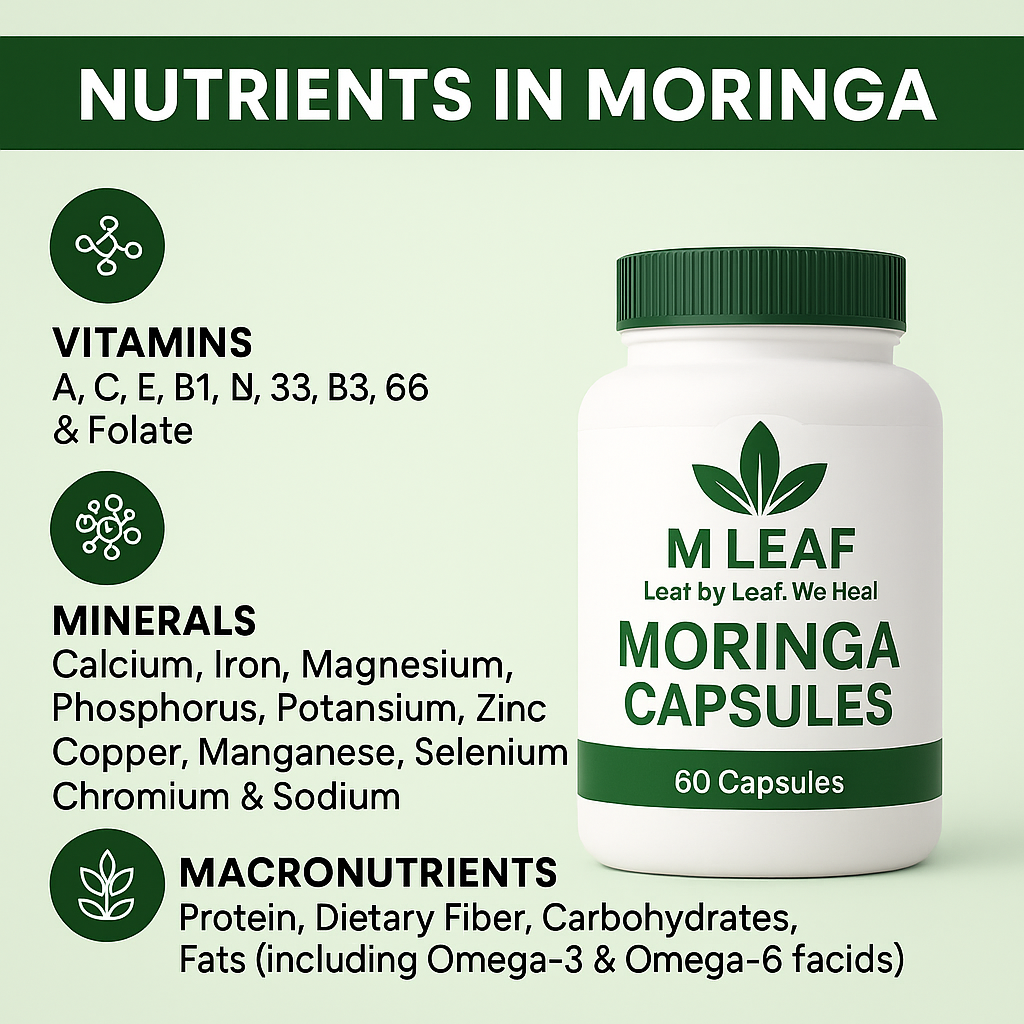Discover Moringa: Your Health's Green Miracle "moringa benefits"
Unlock the incredible moringa benefits for your health! Learn about the numerous moringa health benefits and versatile moringa uses that can enhance your well-being and vitality.
10/11/20257 min read


Introduction to Moringa
Moringa, scientifically known as Moringa oleifera, is a plant celebrated for its impressive array of nutritional properties and health benefits. Known colloquially as the "drumstick tree" or "miracle tree," this versatile plant is native to the Indian subcontinent but has established a presence in many tropical and subtropical regions around the globe. The multiple facets of moringa are tied to its historical significance and cultural relevance, having been utilized for centuries in traditional medicine and dietary practices.
The origins of moringa can be traced back to ancient civilizations where it was revered not only as a food source but also for its healing attributes. Its leaves, pods, seeds, and roots have been integral components of various traditional remedies, aimed at treating ailments such as inflammation, nutritional deficiencies, and digestive issues. Various cultures, especially in regions like Asia and Africa, have integrated moringa into their diets, taking advantage of its rich composition that includes vitamins, minerals, and essential amino acids.
This remarkable plant boasts high concentrations of vitamins A, C, and E, making it a potent antioxidant source. Moreover, the leaves are abundant in protein and various crucial minerals, enhancing moringa's reputation as a superfood. Numerous studies highlight its potential as a functional food, contributing positively to health outcomes through its anti-inflammatory, antimicrobial, and antioxidant properties.
Over the years, the increasing recognition of moringa’s health benefits has led to its incorporation into dietary supplements and health products, making it more accessible to a global audience. As more individuals seek natural and holistic remedies, moringa continues to emerge as a potent ally in promoting wellness and vitality.
Nutritional Profile of Moringa
Moringa, often referred to as the "miracle tree," possesses an exceptional nutritional profile, which supports its status as a superfood. The leaves of the moringa plant are particularly rich in essential vitamins, minerals, proteins, and antioxidants. This remarkable combination of nutrients contributes significantly to overall health and well-being.
One of the standout features of moringa is its high vitamin content. It is notably rich in vitamins A, C, and E. Vitamin A plays a crucial role in maintaining healthy vision and supports immune function. Vitamin C is a powerful antioxidant that aids in the protection of cells from damage, enhances iron absorption, and bolsters the immune system. Meanwhile, vitamin E serves as another potent antioxidant, promoting skin health and protecting against oxidative stress, which can lead to chronic diseases.
Moringa is also a good source of essential minerals, including calcium, iron, and potassium. Calcium is vital for strong bones and teeth, while iron is essential for the production of healthy red blood cells, preventing anemia. Potassium plays a key role in regulating blood pressure and maintaining heart health. Incorporating moringa into one's diet can contribute significantly to meeting daily mineral requirements.
Another highlight of moringa is its impressive protein content. Moringa leaves contain all nine essential amino acids, making it a complete protein source, which is particularly beneficial for vegetarians and vegans seeking to meet their protein needs.
Additionally, moringa's rich antioxidant properties help combat free radicals in the body, potentially reducing inflammation and lowering the risk of chronic diseases. With its multifaceted nutritional profile, moringa solidifies its position as an invaluable addition to a healthy diet.
Health Benefits of Moringa
Moringa, often referred to as a "green miracle," is renowned for its remarkable health benefits, backed by extensive scientific research. This powerhouse plant is particularly celebrated for its anti-inflammatory, antioxidant, and anti-diabetic properties. The anti-inflammatory effects of moringa are primarily attributed to its rich composition of bioactive compounds, such as quercetin and chlorogenic acid. These compounds can help reduce inflammation in the body, making moringa a valuable ally in managing chronic conditions linked to systemic inflammation.
Studies have shown that the antioxidant properties of moringa are significant, as it contains various vitamins and minerals, including vitamins A, C, and E, which combat oxidative stress. By reducing oxidative damage, moringa may help lower the risk of chronic diseases, including cardiovascular issues. Furthermore, moringa leaves can assist in managing cholesterol levels. Research indicates that regular consumption may lead to a reduction in total cholesterol and LDL cholesterol, subsequently improving heart health.
In addition to cardiovascular benefits, moringa has shown promise in controlling blood sugar levels. Several studies suggest that moringa leaves may enhance insulin sensitivity, making it particularly beneficial for individuals with or at risk of developing diabetes. Moringa's ability to regulate blood sugar levels could be attributed to its high levels of isothiocyanates, which help modulate glucose metabolism.
Furthermore, moringa is beneficial in addressing anemia due to its high iron content. Consuming moringa can contribute to increasing hemoglobin levels and improving overall blood health. This superfood, therefore, not only serves as a nutritional supplement but also emerges as an effective natural remedy for various health concerns.
How to Incorporate Moringa into Your Diet
Integrating moringa into your daily diet can be both simple and rewarding. Moringa leaf powder is one of the most common forms available and can be easily added to a variety of meals and beverages. For those seeking convenience, moringa capsules are also an option, allowing for straightforward consumption without the need for preparation.
To start, consider adding moringa powder to your morning smoothies. A tablespoon of moringa powder can enhance the nutritional profile of your favorite fruit and vegetable blends. Combine spinach, banana, and almond milk, and simply stir in the powder for an invigorating start to your day. Additionally, moringa tea can be prepared by steeping fresh or dried leaves in hot water. This beverage offers a soothing way to enjoy moringa's benefits while providing hydration.
When preparing salads, fresh moringa leaves can be introduced as a nutritious topping. Their slightly earthy flavor pairs well with a variety of dressings and toppings. You might also integrate moringa powder into salad dressings, creating a nutrient-dense vinaigrette. Simply whisk together olive oil, vinegar, a teaspoon of honey, and flourished moringa powder for an invigorating dressing.
For more substantial meals, moringa can be added to soups and stews. The powder can be stirred into your favorite recipes during the cooking process, enriching the dish without altering the flavor significantly. Furthermore, moringa works well in grain dishes, such as rice or quinoa, where it can be mixed in during cooking or sprinkled on finished servings.
For those interested in baking, moringa powder can be included in recipes for pancakes, muffins, or energy bars. In these applications, the powder serves not only as a nutritional booster but also brings a vibrant green color to the final product. By experimenting with these ideas, you can easily incorporate moringa into your diet and enjoy its wide array of health benefits.
Potential Side Effects and Precautions
Moringa, often referred to as the “miracle tree,” is praised for its extensive health benefits; however, it is essential to recognize potential side effects and implement necessary precautions for safe consumption. Moringa leaves, pods, and seeds are generally regarded as safe for most people when consumed in moderation. Nevertheless, specific groups, including pregnant women and children, should exercise caution. Pregnant women, in particular, are advised against consuming moringa roots and flowers, as they may induce uterine contractions, leading to adverse outcomes. Conversely, moringa leaves in moderate amounts may offer nutritional benefits without significant risk.
For children, the consumption of moringa should also be monitored. While moringa can be nutritious, parents should ensure it is provided in appropriate quantities relative to a child's age and size. Introducing moringa in gradual increments may help gauge any potential allergic reactions or sensitivities. Furthermore, those on medications must consult with healthcare providers before incorporating moringa into their diet, as it can interact with certain drugs, particularly those affecting blood pressure and diabetes management. Moringa's ability to lower blood sugar may enhance the effect of diabetes medications, requiring careful monitoring of blood glucose levels.
Additionally, maintaining a reasonable daily intake of moringa is crucial to minimize potential digestive issues such as bloating or diarrhea. Generally, consuming 1-2 teaspoons of moringa powder or a handful of fresh leaves daily is recommended, though individual tolerances may vary. To preempt any unwanted effects, newcomers to moringa may consider starting with a lower dosage and gradually increasing it over time. Enhanced awareness of these factors can help individuals reap the health benefits of moringa while mitigating risks associated with its consumption.
Sustainability and Ethical Considerations
Moringa, often referred to as a "green miracle," has gained popularity for its remarkable nutritional profile and health benefits. However, as the demand for this superfood continues to rise, it becomes crucial to address sustainability concerns and ethical sourcing practices. Ensuring that moringa is harvested responsibly not only protects the environment but also supports the livelihoods of local farmers.
Traditionally, moringa has been cultivated in tropical and subtropical regions. As the market grows, there is a pressing need to implement sustainable agricultural practices. This includes avoiding overexploitation of natural resources, promoting bio-diversity, and safeguarding ecosystems. Farmers should focus on organic farming methods that minimize the use of harmful pesticides and fertilizers, thereby protecting soil health and local water sources. Sustainable farming practices benefit farmers economically while preserving the ecological balance.
Ethical sourcing plays a significant role in the moringa supply chain. Supporting local farmers ensures they receive fair wages and encourages community development. By opting for products from certified organic sources or directly sourcing from farmers’ cooperatives, consumers can contribute to fair trade practices that empower these communities. This approach not only helps uplift the local economy but also promotes a deeper connection between consumers and the origins of their food.
Moreover, educating consumers about sustainability and ethical sourcing is paramount. Increased awareness can lead to more informed choices when purchasing moringa products. Assuring that the moringa harvested is from sustainable and ethical sources is essential for preserving this miraculous plant and preventing potential environmental degradation. Therefore, fostering a strong relationship between consumers and producers is key to ensuring that the flourishing moringa market contributes positively to both health and the planet.
Conclusion
In conclusion, the incorporation of moringa into our diets presents a remarkable opportunity to enhance overall health and wellness. This green miracle offers an impressive array of health benefits, including abundant vitamins, minerals, and antioxidants that promote optimal bodily functions. Research has highlighted that moringa may play a significant role in managing blood sugar levels, supporting heart health, and improving digestive functions. Furthermore, its anti-inflammatory properties can contribute positively to reducing chronic illnesses.
As we reflect on the importance of a balanced diet, introducing moringa can serve as an effective means of boosting nutrient intake. Whether consumed in powder form, as capsules, or brewed as tea, this versatile superfood can easily fit into various meals and snacks, making it an accessible option for individuals seeking healthier alternatives. However, it is crucial to be mindful of the sourcing and consumption practices related to moringa. Ensuring that the product is sourced sustainably not only promotes personal health but also supports environmental preservation.
Moreover, users should always consult healthcare professionals before making significant dietary changes, particularly if they have pre-existing health conditions or are taking medications. Incorporating moringa with care allows individuals to enjoy its multitude of benefits while maintaining safety and efficacy. By embracing moringa and making informed choices about its use, individuals can take valuable steps toward leading a healthier lifestyle that is both nourishing and responsible. As awareness of this green superfood continues to grow, it is an opportune moment to recognize the potential moringa holds and to consider its place in our daily routines.
Wellness
Experience vitality with our natural herbal solutions—crafted to boost immunity, detoxify, and energize. Pure, plant-based wellness for everyday health, rooted in Ayurvedic tradition.
Contact us
support@mleaf.co.in
+91-9911382286
© 2025. All rights reserved.
